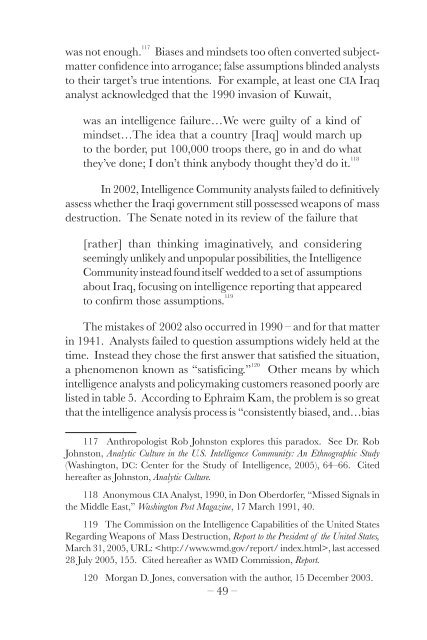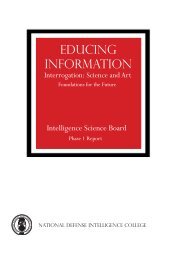Critical Thinking and Intelligence Analysis
Critical Thinking and Intelligence Analysis
Critical Thinking and Intelligence Analysis
Create successful ePaper yourself
Turn your PDF publications into a flip-book with our unique Google optimized e-Paper software.
was not enough. 117<br />
Biases <strong>and</strong> mindsets too often converted subjectmatter<br />
confidence into arrogance; false assumptions blinded analysts<br />
to their target’s true intentions. For example, at least one CIA Iraq<br />
analyst acknowledged that the 1990 invasion of Kuwait,<br />
was an intelligence failure…We were guilty of a kind of<br />
mindset…The idea that a country [Iraq] would march up<br />
to the border, put 100,000 troops there, go in <strong>and</strong> do what<br />
they’ve done; I don’t think anybody thought they’d do it. 118<br />
In 2002, <strong>Intelligence</strong> Community analysts failed to definitively<br />
assess whether the Iraqi government still possessed weapons of mass<br />
destruction. The Senate noted in its review of the failure that<br />
[rather] than thinking imaginatively, <strong>and</strong> considering<br />
seemingly unlikely <strong>and</strong> unpopular possibilities, the <strong>Intelligence</strong><br />
Community instead found itself wedded to a set of assumptions<br />
about Iraq, focusing on intelligence reporting that appeared<br />
to confirm those assumptions. 119<br />
The mistakes of 2002 also occurred in 1990 – <strong>and</strong> for that matter<br />
in 1941. Analysts failed to question assumptions widely held at the<br />
time. Instead they chose the first answer that satisfied the situation,<br />
a phenomenon known as “satisficing.” 120<br />
Other means by which<br />
intelligence analysts <strong>and</strong> policymaking customers reasoned poorly are<br />
listed in table 5. According to Ephraim Kam, the problem is so great<br />
that the intelligence analysis process is “consistently biased, <strong>and</strong>…bias<br />
117 Anthropologist Rob Johnston explores this paradox. See Dr. Rob<br />
Johnston, Analytic Culture in the U.S. <strong>Intelligence</strong> Community: An Ethnographic Study<br />
(Washington, DC: Center for the Study of <strong>Intelligence</strong>, 2005), 64–66. Cited<br />
hereafter as Johnston, Analytic Culture.<br />
118 Anonymous CIA Analyst, 1990, in Don Oberdorfer, “Missed Signals in<br />
the Middle East,” Washington Post Magazine, 17 March 1991, 40.<br />
119 The Commission on the <strong>Intelligence</strong> Capabilities of the United States<br />
Regarding Weapons of Mass Destruction, Report to the President of the United States,<br />
March 31, 2005, URL: , last accessed<br />
28 July 2005, 155. Cited hereafter as WMD Commission, Report.<br />
120 Morgan D. Jones, conversation with the author, 15 December 2003.<br />
– 49 –
















